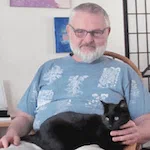The other day, I was watching a TV program set during World War II. An American bomber group was about to drop leaflets over Nazi-occupied territory. The French text of the leaflet appeared briefly on screen, and I hit the pause button.
I got the gist of the leaflet. Maybe eighty-percent. It was something like, “It has become necessary to bomb this town. Leave immediately.” This would be terrific except that I have studied French on and off for more than sixty years.
I grew up with a father who spoke French. One of his brushes with fame was that, for about a week during World War II, he served as General Omar Bradley’s personal interpreter.
My father did not teach me the language, but I often wished that we could have had more in common than we did, and being able to share a language that no one else in the family spoke might have brought us closer together.
I was inspired, at about age nine, to take a French textbook from the public library and study it. One sentence from the book, I can rattle off to this day. Qu’est-ce que voulez vous le faire ce matin? which is the wordiest of at least three ways to ask, “What do you want to do this morning?” That was about as far as it went, though.
Then, in high school, I took French for three years with three different teachers: a man followed by two women. One was a native speaker. Her English was imperfect, but if we had been prohibited from speaking English in class, that might have been ideal. This was not how we were taught, though. Quel dommage.
My father died during my senior year of high school. I never got to have a conversation in French with him, but the desire to learn the language did not die with him.
When I got to college, I took a French placement test at the start of freshman year, the texts that I was supposed to translate just swam before my eyes, seeming to be so much gibberish. It turned out that my three years of lackadaisical study had rendered me too far behind to be put in an advanced class, yet too advanced to begin over again. I was prohibited from taking French.
In my twenties, I improved my knowledge of French by taking a course at Alliance Française in Boston. I only stuck with it a short while, but at the same time, I began taking advantage of access to French-language films, mainly picking up some slang.
When I lived in Berkeley, Calif., I took French lessons from a private teacher, in a class of only six students. I learned a little more, and the teacher, Simone, a native speaker, complimented my pronunciation, but, once again, I did not stick with it for more than a few months.
In 1998, I toured Europe visiting France, Switzerland, Austria, and Germany. Before I went, I committed to memory a few useful phrases in French and German, and these helped sometimes. Quelle est la distance jusqu’en . . . ? (“How far is it to . . . ”) actually came in handy once.
A few years ago, I took a free online French course at duolingo.com, which I finished, only to realize that there was no more to it. You are expected to take the course over and over to reinforce what you have learned.
Over the years, each time I have studied French, a little more has stayed with me. Still, I tend to remember some basic words while forgetting others. For example, selon means “according to.” Why do I keep having to relearn that word? (Maybe now I will have learned it.)
Polyglots say that the only way to learn a language is to make it part of your daily routine for as long as it takes to master it. I seem to study French in spurts. I recently went back to duolingo.com and handled a basic test extremely well.
I will never have those conversations in French with my father. At this point I will probably never master the language as well as he did, but I plan to keep going back to the study of French for the rest of my life.


Share this post with your friends.


My title originally was “Le Français et Moi”